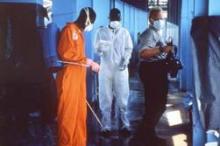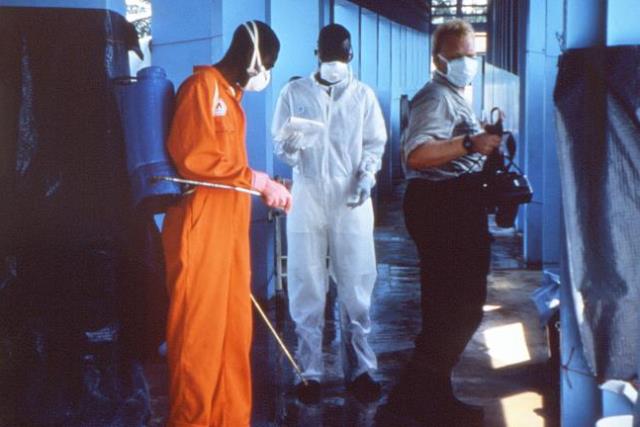User login
ATLANTA – The U.S. Centers for Disease Control and Prevention warned against nonessential travel to three West African countries facing the largest outbreak of Ebola virus in history and announced that it will send 50 more CDC personnel to assist those countries in the next 30 days.
The Ebola outbreak along the borders shared by Guinea, Liberia, and Sierra Leone is worsening, prompting the CDC to upgrade its response 4 days after it advised the public to take sensible, enhanced precautions when considering travel to that region.
The current outbreak is "the largest, most complex outbreak [of Ebola virus] that we know of in history," said Dr. Tom Frieden, director of the CDC. There is no known effective treatment for Ebola or vaccine against it.
The U.S. population is not at risk of an Ebola outbreak, however, because it has quarantine stations at all major ports of entry and isolation facilities in every hospital that has an intensive care unit, he said. The United States has a health care infrastructure better equipped to identify people who might have Ebola, rapidly test for the virus, monitor patients for signs of illness, and provide supportive care with infection control, Dr. Frieden added.
If health care workers see a patient who has a fever or other serious illness and has traveled to any of the three African countries recently, they should contact the CDC to arrange rapid testing and appropriate follow-up. An estimated 10,000 people travel between the United States and the three countries during a normal 3- or 4-month period, he said.
It’s important to note that Ebola is not spread by airborne routes, food, or water. People infected with Ebola are not contagious unless they are sick and someone comes in close contact with their infected bodily fluids. Anyone who may have been exposed to Ebolavirus (and all of their contacts) should be watched daily for 21 days to see if fever develops, Dr. Frieden said.
Many of the people who have died in the West African outbreak have been health care workers or people attending traditional funerals that include contact with the deceased person’s body.
The travel warning grew out of concern that people traveling to the West African countries might need medical attention for reasons unrelated to Ebola (such as appendicitis, a broken bone, or injuries sustained in a car accident), further stressing the local medical facilities and potentially exposing the travelers to Ebola when seeking care.
The surge in CDC infection control specialists headed to West Africa will help those countries develop the capacity to rapidly identify and isolate infected people and to screen travelers who are thinking of flying out of the country.
The CDC has worked with other African countries in the past to quell Ebola outbreaks through boots-on-the-ground infection control procedures. In Uganda, for example, working with traditional healers to recognize signs of Ebola and to make burial practices safer changed the environment so that "where there used to be large outbreaks, there are now single cases," Dr. Frieden said.
Quelling the West African outbreak would take at least 3-6 months under ideal conditions, but surely will take longer in West Africa, facing its first Ebola outbreak, he noted. The medical and public health infrastructures are limited and not used to dealing with Ebola, and public misconceptions about the virus have led to violence against some infection control workers.
"We already had one team that was confronted by an angry group of people and had to retreat across border to a safe country," Dr. Frieden said.
On Twitter @sherryboschert
ATLANTA – The U.S. Centers for Disease Control and Prevention warned against nonessential travel to three West African countries facing the largest outbreak of Ebola virus in history and announced that it will send 50 more CDC personnel to assist those countries in the next 30 days.
The Ebola outbreak along the borders shared by Guinea, Liberia, and Sierra Leone is worsening, prompting the CDC to upgrade its response 4 days after it advised the public to take sensible, enhanced precautions when considering travel to that region.
The current outbreak is "the largest, most complex outbreak [of Ebola virus] that we know of in history," said Dr. Tom Frieden, director of the CDC. There is no known effective treatment for Ebola or vaccine against it.
The U.S. population is not at risk of an Ebola outbreak, however, because it has quarantine stations at all major ports of entry and isolation facilities in every hospital that has an intensive care unit, he said. The United States has a health care infrastructure better equipped to identify people who might have Ebola, rapidly test for the virus, monitor patients for signs of illness, and provide supportive care with infection control, Dr. Frieden added.
If health care workers see a patient who has a fever or other serious illness and has traveled to any of the three African countries recently, they should contact the CDC to arrange rapid testing and appropriate follow-up. An estimated 10,000 people travel between the United States and the three countries during a normal 3- or 4-month period, he said.
It’s important to note that Ebola is not spread by airborne routes, food, or water. People infected with Ebola are not contagious unless they are sick and someone comes in close contact with their infected bodily fluids. Anyone who may have been exposed to Ebolavirus (and all of their contacts) should be watched daily for 21 days to see if fever develops, Dr. Frieden said.
Many of the people who have died in the West African outbreak have been health care workers or people attending traditional funerals that include contact with the deceased person’s body.
The travel warning grew out of concern that people traveling to the West African countries might need medical attention for reasons unrelated to Ebola (such as appendicitis, a broken bone, or injuries sustained in a car accident), further stressing the local medical facilities and potentially exposing the travelers to Ebola when seeking care.
The surge in CDC infection control specialists headed to West Africa will help those countries develop the capacity to rapidly identify and isolate infected people and to screen travelers who are thinking of flying out of the country.
The CDC has worked with other African countries in the past to quell Ebola outbreaks through boots-on-the-ground infection control procedures. In Uganda, for example, working with traditional healers to recognize signs of Ebola and to make burial practices safer changed the environment so that "where there used to be large outbreaks, there are now single cases," Dr. Frieden said.
Quelling the West African outbreak would take at least 3-6 months under ideal conditions, but surely will take longer in West Africa, facing its first Ebola outbreak, he noted. The medical and public health infrastructures are limited and not used to dealing with Ebola, and public misconceptions about the virus have led to violence against some infection control workers.
"We already had one team that was confronted by an angry group of people and had to retreat across border to a safe country," Dr. Frieden said.
On Twitter @sherryboschert
ATLANTA – The U.S. Centers for Disease Control and Prevention warned against nonessential travel to three West African countries facing the largest outbreak of Ebola virus in history and announced that it will send 50 more CDC personnel to assist those countries in the next 30 days.
The Ebola outbreak along the borders shared by Guinea, Liberia, and Sierra Leone is worsening, prompting the CDC to upgrade its response 4 days after it advised the public to take sensible, enhanced precautions when considering travel to that region.
The current outbreak is "the largest, most complex outbreak [of Ebola virus] that we know of in history," said Dr. Tom Frieden, director of the CDC. There is no known effective treatment for Ebola or vaccine against it.
The U.S. population is not at risk of an Ebola outbreak, however, because it has quarantine stations at all major ports of entry and isolation facilities in every hospital that has an intensive care unit, he said. The United States has a health care infrastructure better equipped to identify people who might have Ebola, rapidly test for the virus, monitor patients for signs of illness, and provide supportive care with infection control, Dr. Frieden added.
If health care workers see a patient who has a fever or other serious illness and has traveled to any of the three African countries recently, they should contact the CDC to arrange rapid testing and appropriate follow-up. An estimated 10,000 people travel between the United States and the three countries during a normal 3- or 4-month period, he said.
It’s important to note that Ebola is not spread by airborne routes, food, or water. People infected with Ebola are not contagious unless they are sick and someone comes in close contact with their infected bodily fluids. Anyone who may have been exposed to Ebolavirus (and all of their contacts) should be watched daily for 21 days to see if fever develops, Dr. Frieden said.
Many of the people who have died in the West African outbreak have been health care workers or people attending traditional funerals that include contact with the deceased person’s body.
The travel warning grew out of concern that people traveling to the West African countries might need medical attention for reasons unrelated to Ebola (such as appendicitis, a broken bone, or injuries sustained in a car accident), further stressing the local medical facilities and potentially exposing the travelers to Ebola when seeking care.
The surge in CDC infection control specialists headed to West Africa will help those countries develop the capacity to rapidly identify and isolate infected people and to screen travelers who are thinking of flying out of the country.
The CDC has worked with other African countries in the past to quell Ebola outbreaks through boots-on-the-ground infection control procedures. In Uganda, for example, working with traditional healers to recognize signs of Ebola and to make burial practices safer changed the environment so that "where there used to be large outbreaks, there are now single cases," Dr. Frieden said.
Quelling the West African outbreak would take at least 3-6 months under ideal conditions, but surely will take longer in West Africa, facing its first Ebola outbreak, he noted. The medical and public health infrastructures are limited and not used to dealing with Ebola, and public misconceptions about the virus have led to violence against some infection control workers.
"We already had one team that was confronted by an angry group of people and had to retreat across border to a safe country," Dr. Frieden said.
On Twitter @sherryboschert
FROM A CDC PRESS CONFERENCE


